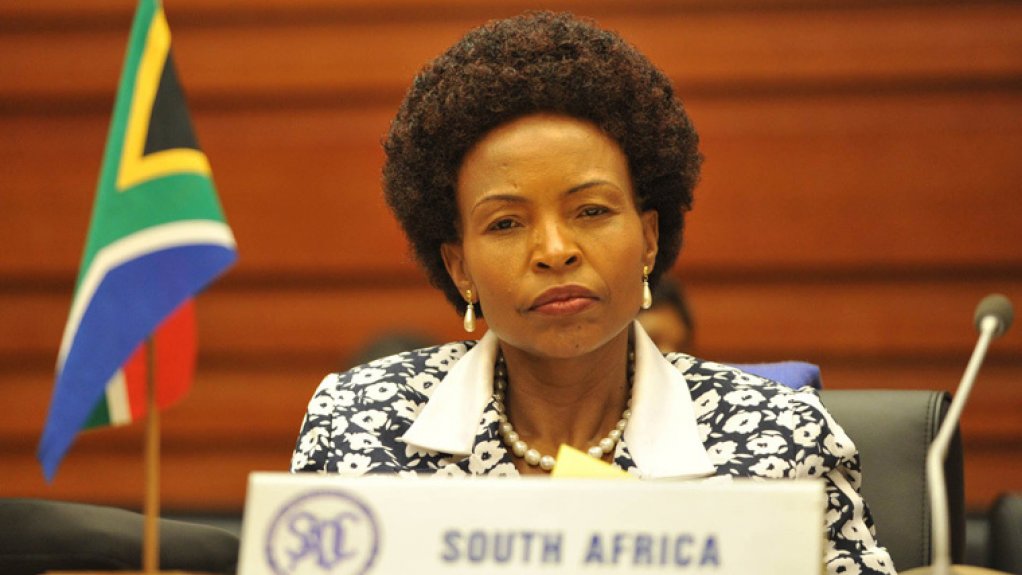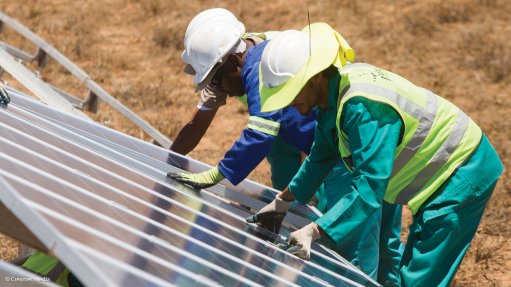Brics bank South Africa’s brainchild, says Nkoana-Mashabane
South Africa is largely considered by its counterparts in the Brazil, Russia, India, China and South Africa (Brics) grouping as being the “pathfinder” on the road to the development of the Brics New Development Bank (NDB), having chaired the coalition since 2013 and championing the creation of a development funding institution since the country’s induction to Brics in 2010.
Addressing several ambassadors to South Africa and other dignitaries during her delivery of a paper entitled ‘South Africa’s chairpersonship of the Brics: From Durban to Fortaleza’ on Friday, International Affairs and Cooperation Minister Maite Nkoana-Mashabane said, while the establishment of a bank was proposed at the fourth Brics Summit, in India, in 2012, the decision to establish the institution was taken at the fifth Brics Summit, in Durban, last year.
“[South] Africa was the first to say we needed this. We went to the sixth Brics Summit [held last month, in Fortaleza, Brazil,] to defend [the mandate] that we wanted to establish a bank for the development of emerging countries.
“The [member countries] said South Africa was a good pathfinder and that they liked the idea of starting a bank. We will continue to work with our progressive [partner States] and maintain this reputation as a pathfinder, but we won’t only do this in pursuit of our own interests,” she commented.
The $100-billion development bank was the first step by emerging markets to reform the Western-dominated international financial system.
South Africa had initially lobbied to host the NDB in Johannesburg, punting the city’s “advantageous” geographical position, which provided leverage for the bank to play a role in developing Africa’s urgently needed infrastructure.
However, the Brics grouping opted for the Chinese city of Shanghai as the bank’s permanent stronghold, which would be supported by an African regional center in Johannesburg.
GET WHAT WE WANT
Commenting on the bank’s bearing on South Africa’s infrastructure ambitions, Nkoana-Mashabane said NDB funding would expedite the country’s development plans, allowing it to “get what we need so we can do [what] we want,” – a reference to South Africa’s cash-hungry National Development Plan.
“South Africa will now be able to call on funding of $10-billion if the need arises, without having to worry that we are putting our children in debt,” she outlined,
adding that there was equal shareholding in the bank by member States, with all decisions to be taken by consensus.
Shareholding would be open to other emerging markets, developing countries and advanced economies, but the Brics countries would retain a 55% majority stake.
In addition to the formation of the NDB, South Africa’s year-long tenure as Brics chair saw it “fully” delivering on its commitments before, last month, handing over the reins to Brazil, Nkoana-Mashabane asserted.
“Not only did we deliver on our promise to establish a bank, we ensured that there was a decision on currency reserve arrangements, launched the Brics Think Tank, established the Brics Business Council and held the Brics Academic Forum,” she said.
“The only outstanding matter is for the member States to have the new bank and the contingency reserve arrangements ratified by their respective Parliaments as a matter of urgency.”
A SEAT AT THE HIGH TABLE
Nkoana-Mashabane, meanwhile, used the opportunity to take aim at the United Nations (UN), suggesting that the exclusion of developing countries as permanent members of the UN Security Council was “undemocratic and unrepresentative”.
She described the council as being governed by an “institution of premier global governments” that discussed and made decisions over issues affecting developing States that had remained unrepresented until the formation of Brics.
While quick to stress that the Brics grouping would not position itself in opposition to the UN and its agendas, she noted that its members were keen to make a “humble” contribution towards global peace, security and growth.
“People in developed countries are sick and tired of sessions in which they are just observers and are not invited to the high table,” she commented.
South Africa, along with several other emerging countries, had long lobbied for the so-called democratisation of the council and the creation of a permanent seat for Africa.
Comments
Press Office
Announcements
What's On
Subscribe to improve your user experience...
Option 1 (equivalent of R125 a month):
Receive a weekly copy of Creamer Media's Engineering News & Mining Weekly magazine
(print copy for those in South Africa and e-magazine for those outside of South Africa)
Receive daily email newsletters
Access to full search results
Access archive of magazine back copies
Access to Projects in Progress
Access to ONE Research Report of your choice in PDF format
Option 2 (equivalent of R375 a month):
All benefits from Option 1
PLUS
Access to Creamer Media's Research Channel Africa for ALL Research Reports, in PDF format, on various industrial and mining sectors
including Electricity; Water; Energy Transition; Hydrogen; Roads, Rail and Ports; Coal; Gold; Platinum; Battery Metals; etc.
Already a subscriber?
Forgotten your password?
Receive weekly copy of Creamer Media's Engineering News & Mining Weekly magazine (print copy for those in South Africa and e-magazine for those outside of South Africa)
➕
Recieve daily email newsletters
➕
Access to full search results
➕
Access archive of magazine back copies
➕
Access to Projects in Progress
➕
Access to ONE Research Report of your choice in PDF format
RESEARCH CHANNEL AFRICA
R4500 (equivalent of R375 a month)
SUBSCRIBEAll benefits from Option 1
➕
Access to Creamer Media's Research Channel Africa for ALL Research Reports on various industrial and mining sectors, in PDF format, including on:
Electricity
➕
Water
➕
Energy Transition
➕
Hydrogen
➕
Roads, Rail and Ports
➕
Coal
➕
Gold
➕
Platinum
➕
Battery Metals
➕
etc.
Receive all benefits from Option 1 or Option 2 delivered to numerous people at your company
➕
Multiple User names and Passwords for simultaneous log-ins
➕
Intranet integration access to all in your organisation





















